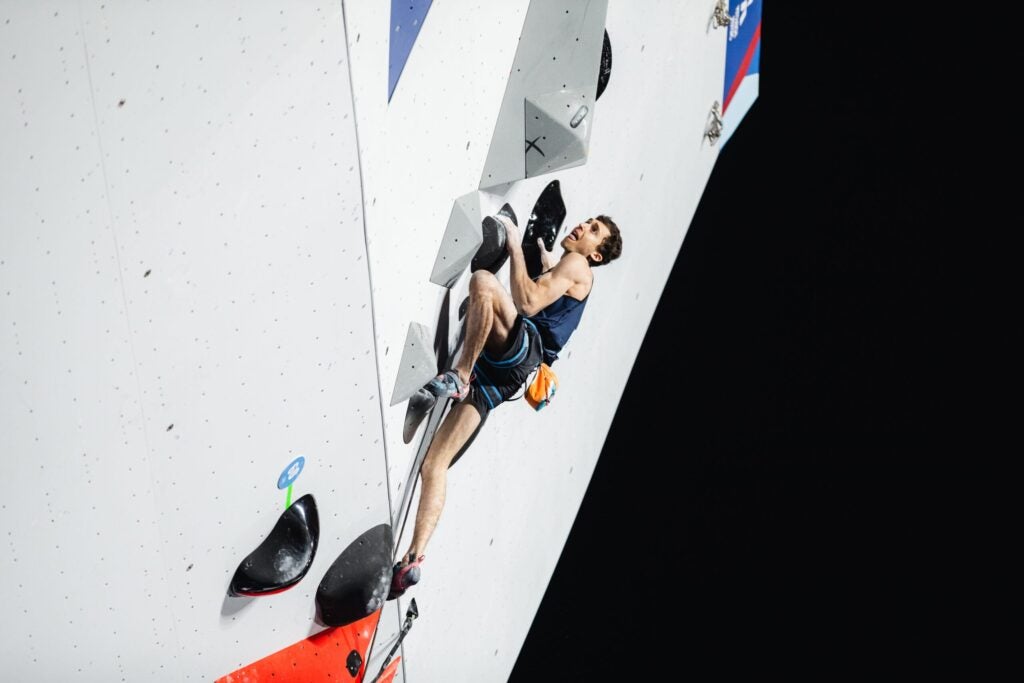No products in the cart.
Outdoor Adventure
What Can You Learn From the Diets of Olympic Climbers?
As excitement for Paris builds, we asked some Team USA athletes headed to the Olympics about their diet, including their favorite sending snacks, training day fueling, and—yes—even the worst thing they ever ate before climbing. Their responses include tales of food poisoning, great fueling ideas, and desserts we must now try. But before we dive into what you can learn from the diets of Olympic climbers, meet some of our Olympians.
Piper Kelly: Speed
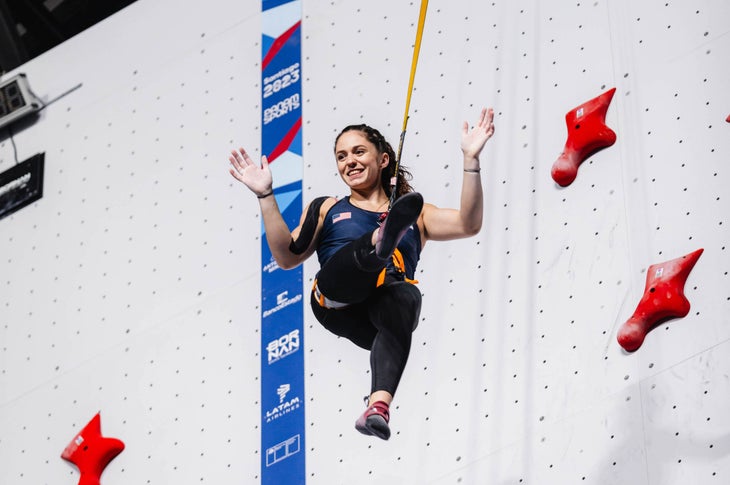
Shoulder surgery in 2020 didn’t stop Kelly from sending her speed route in 7.52 seconds to score a gold medal at the Pan American Games in Santiago, Chile, in October 2023. She holds a degree in exercise science and has been climbing since she was seven years old.
Natalia Grossman: Combined Boulder & Lead
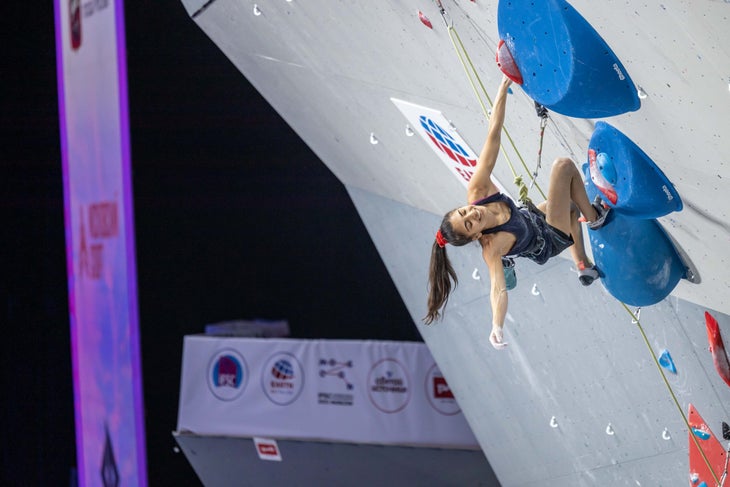
Climbing since she was six years old, Grossman secured her Olympic ticket by winning gold at the 2023 Pan American Games. She has climbed numerous V13s and is one of the most decorated competition climbers in American history, with ten World Cup wins under her belt
Jesse Grupper: Combined Boulder & Lead
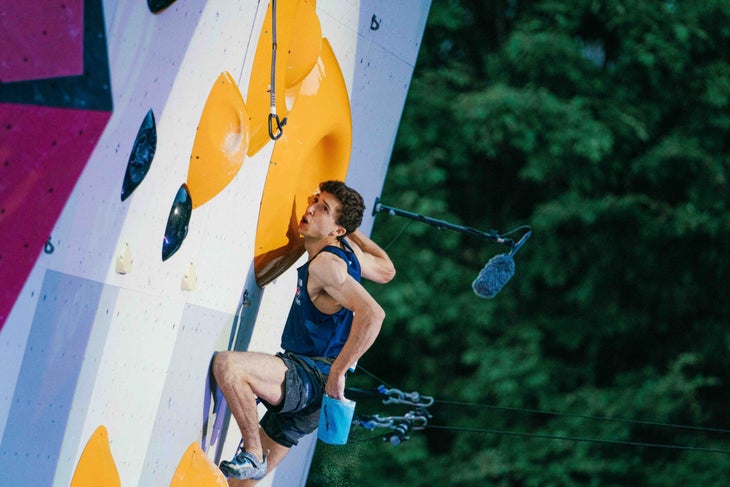
Grupper has ulcerative colitis (a bowel disease), which means that his diet poses challenges beyond the typical elite athlete performance. He has climbed 5.15, is one of the few Americans to flash 5.14c (which he’s done twice), and finished 2nd overall in the 2022 World Cups season. Also an engineer, Grupper has worked designing physical therapy devices for a bioengineering lab out of Harvard University. Like Grossman, Grupper won his Olympic ticket at the Pan American Games, where he took gold in men’s Boulder & Lead.
Samuel Watson: Speed
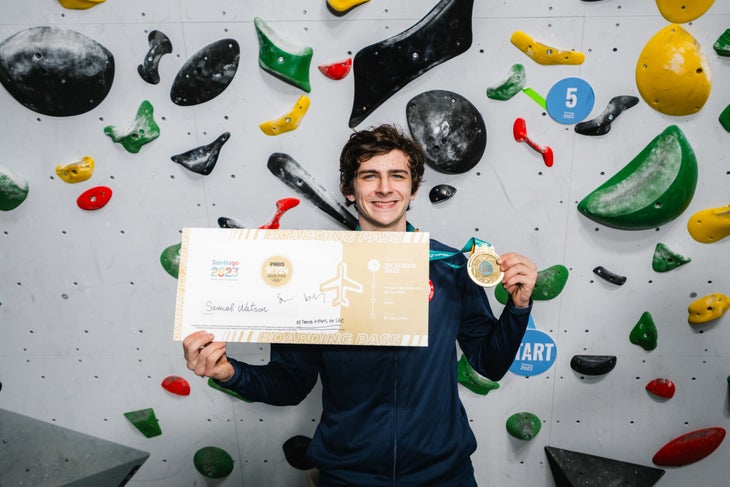
Just 18 years old, Watson is the youngest climber on the U.S. Olympic Team. In Edinburgh, in 2022, he became the youngest person to take gold at an IFSC World Cup. Another product of Pan American Games, Watson’s personal best time in competition is 4.79 seconds.
Emma Hunt: Speed
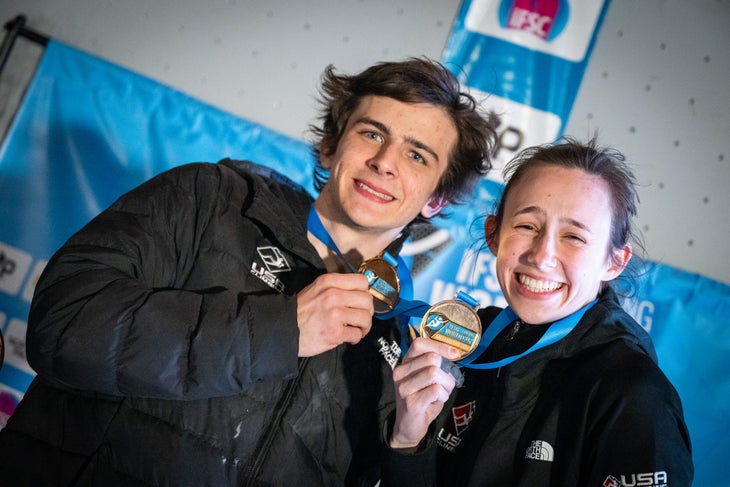
A 21-year-old Georgia native, Hunt set the U.S. women’s Speed record—6.301 seconds—at the IFSC World Cup in Salt Lake City this past April. She has medaled in six World Cups, took second place in the 2022 World Cup season, and won the 2022 World Games in Birmingham.
Not seeing everyone? Check out the full Team USA climbing roster here.
What is your training day food schedule like?
Sports nutritionists currently recommend that, in addition to getting adequate calories throughout the day, athletes should aim to take in simple carbs during active training and then follow their training with a mixed meal with protein, carbs, and fat. These athletes have their routines dialed.
Kelly starts her day with either oatmeal with protein powder or eggs with rice and veggies. During training she fuels with carbs and quick sugars. Around 2 p.m., after training, she has lunch “with an emphasis on protein so I can recover.” Dinner happens around 7:30, after her second training session, “Where I again emphasize protein and vegetables.”
Grupper generally opts for two eggs and avocado toast for breakfast. This is a nice choice, providing protein, vegetables, healthful fats, and fiber for steady energy levels. His snacks of choice include granola, banana and peanut butter, or a protein bar. The granola and banana provide carbs for quick energy, and the protein bar can contribute to a feeling of fullness—all of which are helpful for long training sessions. For lunch, Grupper likes grain bowls with vegetables and tofu, plus a protein shake. For dinner: “I love making pad Thai, curries, and fried rice,” he says.
Hunt doesn’t have a specific training food schedule, but she preps breakfast the day before because she’s “not a morning person.” “My current go-to breakfast is overnight oats with Gnarly Whey Protein, fruit, and sometimes dark chocolate chips,” she says. “I try to eat within an hour of going to the gym so I’ll be full for my whole training session.”
Props to Hunt: skipping breakfast is a common fueling mistake. During the rest of the day, Hunt opts for “super easy meals, like chicken tacos! Then I try to eat as soon as possible after a training session for recovery; this is usually dinner—a balance of protein and my favorite veggies and carbs.”
Do you have any favorite training snacks?
An ideal training snack includes simple, easily-digested carbohydrates, such as a white bagel, gummies, or pretzels. Simple carbs enable the fuel to get metabolized quickly to provide immediate energy to the working muscles; they also tend to be easier on the stomach when climbing. You’ll notice these climbers adopt this practice in their own snack choices.
Kelly’s favorite training snack is GoGo squeeZ Speedy Strawberry applesauce (“perfectly named for speed climbers!” she says). As a bonus, these are easy to eat without greasing up your hands and contain natural sugars for quick energy.
Grossman opts for bananas, apples, or Nature Valley granola bars. Grupper is similar, “I love homemade granola, a protein bar, and bananas.”
Watson, however, is team fruit. He recommends dates: “They are one of nature’s true candies,” he says, “and they’re a fast way to raise my energy levels.” Hunt is also a fruit fan—she loves strawberries—but she supplements with Pop Tarts and Rice Krispie Treats, both of which are “a great way to bring up my blood sugar if it is getting low.”
Water, electrolyte drinks, or energy drinks? When and why?
Kelly and Grossman are both energy drink users. “I am a big fan of caffeine,” Kelly says, “so I always have a Reign Energy Drink before my morning training session. Not the healthiest option maybe, but we all have our vices!” She also uses water and a hydration mix. Grossman, who’s sponsored by Red Bull, opts to save the energy drinks for comp day.
Hunt says, “I drink water throughout the day. And I love drinking Powerade! I feel way more hydrated when I drink it, and it’s good for electrolytes. I drink it during training sessions and always look for it when traveling.” Hunt is onto something, as electrolytes need replenishment during and after intense training sessions; they can also help counteract travel dehydration from the dry air and the pressurized cabins in airplanes.
Grupper drinks mostly water but adds electrolyte tablets on hot summer training days. Watson also prefers water.
How do you factor timing into your eating schedule?
“I really like to eat a larger meal two hours before I climb,” says Grupper, “and if I’m doing multiple hard rounds in a day, having something filling like a protein bar or a banana and peanut butter an hour out from the round is important for me. I also like having a small snack about 30 minutes before a hard indoor effort or outdoor project.”
Hunt dials her nutrition in by factoring timing into her food schedule. She does this by making sure to eat balanced meals before and after training. “Part of my food schedule is making sure I plan for meal prepping so I always have meals ready to go.”
Are you a vegan, vegetarian, pescatarian, or an omnivore? And why?
Diet patterns are very personal, and each climber has their reasons for following a specific one. Kelly, for instance, says she doesn’t eat red meat, but she does eat white meat such as chicken and turkey. She likes these leaner sources of protein, since she follows a somewhat low-fat diet. Grossman, meanwhile, has been a pescatarian for about 10 years. And Grupper has a specific diet due to his ulcerative colitis, which informs what he can comfortably eat.
“Having the condition has pushed me to follow a gluten and dairy free diet,” he says, “and also avoid fried food. For environmental reasons I also follow a mostly pescatarian diet. Needless to say, finding a restaurant on the road can be a bit of a challenge.”
While Kelly, Grupper, and Grossman’s approaches to diet are restrictive, these diets can still be conducive to high performance and health so long as the athletes make sure to get ample calories and nutrients.
Watson and Hunt, meanwhile, are omnivores, which is healthy due to the wide variety of food available to them. More food options usually results in increased nutrient intake. “I love cooking and the different options that come along with being an omnivore!” Watson said.
“I like meat,” agreed Hunt “My pre-comp dinner is a burger from Five Guys! It’s the perfect size and tastes so good!”
If your stomach can tolerate it, a burger can be a good night-before choice because it offers protein, fat, and carbohydrate. Mixed meals like this tend to digest more slowly, giving a steady energy source for an hours-long competition. Adding in some quickly digesting simple carbs closer to climb time can help fuel a solid climbing performance.
What is the worst thing you ever ate before climbing? And… what happened?
Hunt identifies a mistake I see over and over as a sports dietitian: Just because salads are a healthful food choice doesn’t mean they will translate well into fueling for a climbing session. “When I was a youth competitor, a group of us decided to eat a super basic salad for our pre-comp meal,” she said. “We thought that salads were healthy and we wanted to feel good and healthy before we climbed. As you can imagine, it was not our best competition. We didn’t have enough proper fuel for good fast laps. This comp landed salads on the permanent ‘not for comps’ meal list.”
Milkshakes were a bad idea back when Grupper did not yet know he had a bowel disease. “Before I was dairy free,” he said, “I used to have a large milkshake after a full day of climbing outside. The ride home was not a fun experience for anyone else in the car.”
What food item do you always have with you when traveling to comps?
Kelly always has applesauce when traveling to competitions, though another favorite is Uncrustables. Grossman always brings gummy bears. Grupper carries chocolate, bananas, and Cheerios. (“You have to have your comfort food!” he says)
Watson prefers dates, fig bars, energy bites, and other simple carbs. “A shaker bottle and some protein powder is also a good option for longer days,” he adds.
Hunt, meanwhile, isn’t taking any chances after her salad experience: “I bring a whole pantry of food with me to comps,” she says. “I think it’s why my suitcase is always so heavy. I bring Gnarly Whey Protein, bagels, Zone bars (I love the Fudge Grams), Nature’s Bakery Fig Bars, and Rice Krispie Treats.”
What’s your favorite dessert?
Kelly: “Probably Crumbl Cookies. But you can never go wrong with chocolate and peanut butter.
Grossman: “Ben and Jerry’s with whipped cream.”
Grupper: “Nora Cooks Mug Cake! If you haven’t tried it, you have to! As a backup, anything chocolate usually does the trick.”
Watson: “Chocolate lava cake.”
Hunt: “Chocolate cake and frosting is my favorite! I always look for some after comps, but will settle for almost anything chocolate.”
Author’s Note: While it’s fun to explore what elite athletes eat, copying their diet isn’t always the best plan. Everyone has unique nutrition needs based on a variety of factors. We hope you come away from this article inspired to try new things and find out what works for you.
Marisa Michael, MSc, RDN, CSSD Marisa Michael, MSc, RDN, CSSD is a board-certified specialist in sports dietetics and author of Nutrition for Climbers: Fuel for the Send. She serves on the USA Climbing medical committee and has a private practice in Portland, Oregon. Find her online at nutritionforclimbers.com or on Instagram @realnutritiondietitian for nutrition coaching, workshops, and writing services.

